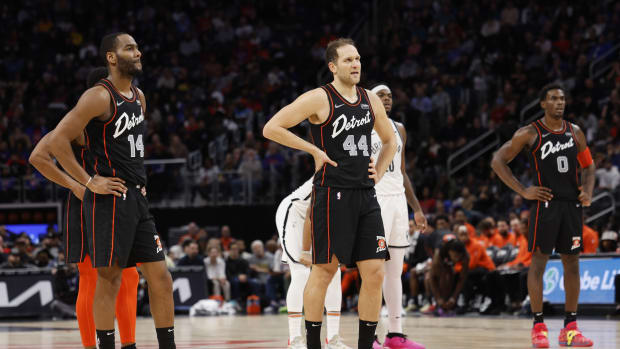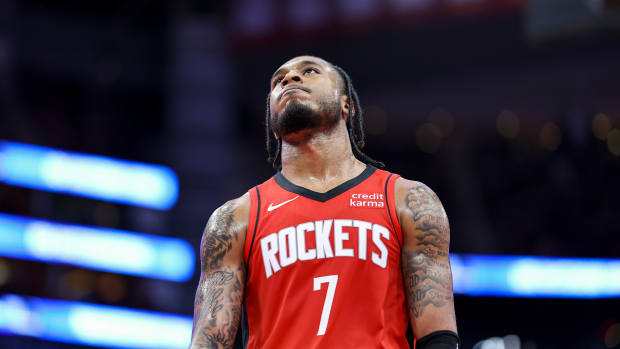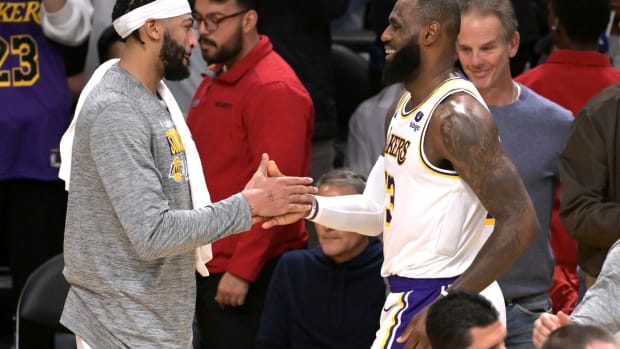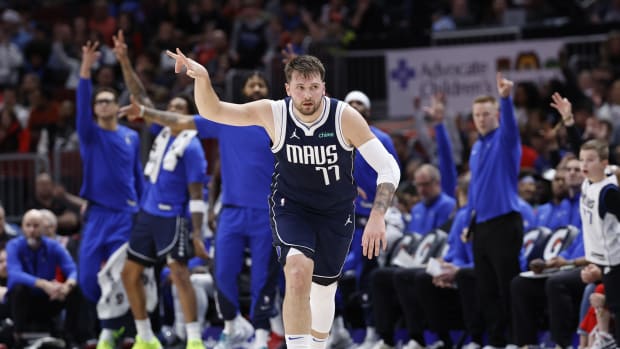Is There Still Time for Rodney Hood to Rediscover Form for Cavs?
OAKLAND — The day before the NBA Finals, as the Cavaliers prepared for practice at Oracle Arena, Gary Payton summoned Rodney Hood into the stands behind the basket. Payton had never met Hood, but on the drive to Oracle, he decided to seek out the enigmatic 25-year-old who over the span of four months has fallen from the marquee in Utah to the abyss in Cleveland. When the Cavs acquired Hood, as part of their trading deadline bender, he was in the midst of his most prolific NBA season: scoring 16.8 points per game, shooting 38.9 percent from three and absorbing much of the slack left behind by the departed Gordon Hayward.
Of all the reinforcements Cleveland landed in its February frenzy—George Hill, Jordan Clarkson and Larry Nance Jr. among the cavalry—Hood seemed the most significant, a stretchy 6’8” wing who can space the floor and guard multiple positions, precisely the kind of modern hybrid the Cavs could deploy against the Warriors. On Hood’s first day with his new team, he scored 15 points on 6-of-11 shooting and the Cavaliers blew out the Celtics in Boston, even though none of the new additions had been through a practice or learned the plays.
“We were so full of energy that day,” Hood recalls. “It was one of those games where we weren’t thinking. We were so excited to be there. But that wears off and you figure out who you really are.” So who is Rodney Hood, the burgeoning off-ball scorer who flourished for three years in Quin Snyder’s motion offense, or the reluctant sniper who has wilted next to LeBron James and languished at the end of Cleveland’s shallow bench? It is a question that confounds the Cavs, as they search for somebody to help James, and mystifies other clubs, as they gauge Hood’s value before he becomes a restricted free agent in July.
All players are affected by trades, but few as severely as Hood, who is averaging 4.6 points in the playoffs, shooting 15.8 percent from three and logging just slightly more minutes than Kendrick Perkins. “This is my first time ever having DNPs in my life,” Hood said. “I look back at my Utah highlights on YouTube, just to remind myself: 'That was this year.”' It’s hard for anybody to comprehend how he could be so viable in one place and so irrelevant in another. The Cavaliers are not the Warriors, after all, teeming with talent. In theory, they could use anybody who is 6’8” and can shoot, except it seems Rodney Hood.
“What I want to know is, ‘What’s the problem?’” Payton wondered. “When a player like this plays like that, it’s almost always because he’s thinking about too much stuff. ‘Where will I be next year? Will I get a contract?’ You start doing that, you don’t play well for a while, you don’t score, you lose some in confidence in yourself and then everybody else loses confidence in you. It’s a bad cycle.”
Soft-spoken and mild-mannered, Hood listened silently to Payton in the seats above the baseline, The Glove providing an earful. “I told him, ‘You can play this game,’” Payton relayed. “‘You’ve played this game your whole life. You have to stop thinking about all these other different things. You’ve got a guy on your team who can do anything, and if you get him to gain confidence in you, he’ll find you out there and you can knock those shots down just like you’ve always done.’”
Payton is not the first person to volunteer a pep talk. Hood hears a similar message from Joe Johnson, a former teammate in Utah, and Johnnie Bryant, still an assistant with the Jazz. He labors to explain why his trajectory has changed so dramatically, and so quickly, but people close to him offer some logical theories. Hood expected to star in Utah after Hayward bailed, and he did to some degree, until rookie point guard Donovan Mitchell usurped him. Hood, who had never been traded before, was stung by the move. “It was extremely hard for me,” he admitted. Not only was he putting up career-highs, his wife was eight months pregnant with twins, and suddenly they were starting over in Cleveland.
Some players can acclimate on the fly to a new roster and a new offense. Others require a longer runway. In Utah, Hood knew in advance where he would get his shots, typically off cuts and dribble hand-offs. The Jazz have a well-defined system. The Cavaliers have a system, too, but it’s mainly to freelance off James. He finds shooters, and when they don’t convert, they sit. A Duke product, Hood is accustomed to high stakes, but the Finals-or-bust atmosphere in Cleveland is unique. “If you lose a game, you feel like the world is coming down,” Hood said. “If you win, you’re supposed to. It’s still a struggle for me to adapt to that.”
In Game 4 of the Eastern Conference semifinals, with the Cavaliers routing the Raptors by 30 points midway through the fourth quarter, coach Tyronn Lue called on Hood for mop-up duty and he remained chained to the bench. Cavs sources maintain his refusal to enter was not an act of protest, and rather, he didn’t feel mentally or physically prepared to play. He apologized to teammates and coaches, and in Game 1 of the conference finals, he managed 11 points on 5-of-12 shooting against Boston. But in Game 2, he only put up two shots in 11 forgettable minutes, and since then he hasn’t played a meaningful second.
It’s not as if he’s sitting behind the best and brightest, either. In the Finals opener, Clarkson went 2-for-9, chucking brainless jumpers virtually every time he touched the ball. J.R. Smith was a minus-22 and committed one of the most notorious gaffes in Finals history. Who knows whether their blunders were glaring enough to actually get Hood onto the court. He has been working with Cavaliers assistant coach Phil Handy and visualizing himself on the big stage, rediscovering the scorer left behind in Utah. He recounts close games he played against the Warriors, when he attacked their switches and Rudy Gobert deterred their drives.
Lue has not forgotten him, lecturing Hood about the importance of urgency. When called upon, he must perform, immediately. There is no time to hone his stroke or find his rhythm. LeBron James does not run a development program. “If I get out there for five minutes or three minutes or 20 minutes, I can’t ease my way into the game,” Hood said. “As soon as I get in, I’ve gotta get after it. I want to make an impact. I’ve got a feeling that at some point I’m going to be used.”




































